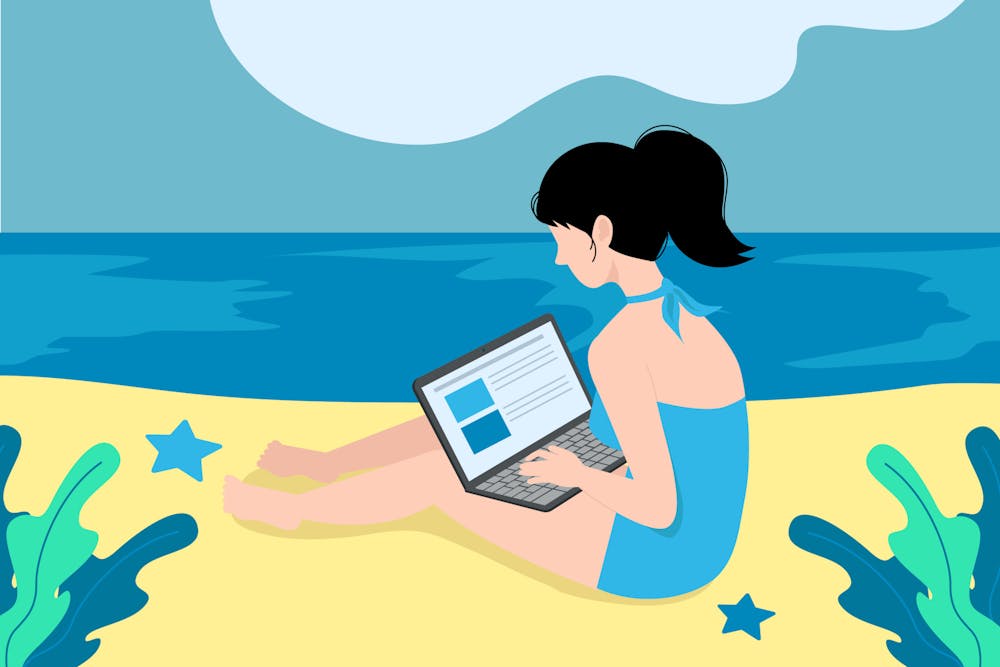If you spent your break checking Canvas from the beaches of Cancún or frantically writing papers from airport terminals, you are not the only one. Contrary to what the name might suggest, spring break doesn’t always feel like a break. Our academic responsibilities seldom pause for our vacations with friends or trips back home.
Students at Hopkins deserve the opportunity to take a real break. Yet, when we are concerned about looming paper deadlines and midterm exams set for the first week back, we aren’t able to relax to the fullest.
Though the deans of the Whiting School of Engineering have issued a request for faculty to "consider" refraining from burdening students with assignments during spring break, the effectiveness of this appeal is questionable. The University should be doing more — beyond vague and flimsy language — to ensure that students get a break. The failure to implement enforceable measures underscores a broader issue within the institution’s approach to student wellness. Merely encouraging faculty to exercise restraint fails to address the academic pressures that perpetuate a culture of overwork and burnout.
So as we reflect on yet another spring break characterized by relentless academic demands, we advocate for substantive change. We must strive to foster a university culture that prioritizes the mental health and well-being of its students, ensuring that breaks are truly restorative rather than merely extensions of the semester’s coursework.
In the past, the Student Government Association has made efforts to discourage faculty from assigning work over academic breaks, but ultimately the change must come from the professors themselves. They’re the ones who make the syllabi, and they should do so with the academic calendar in mind.
Professors are not unaware of the mental health challenges university life poses for students. In a survey from the 2022-23 academic year, 90% of faculty at colleges acknowledged that student mental health today is worse than it was when they began teaching. Yet, many continue to assign work over periods that are intentionally set aside for us to recuperate.
Current seniors are especially cognizant of why spring break is so important. In 2021, due to the COVID-19 pandemic, the University replaced the traditional week-long spring break with five separate days off interspersed throughout the semester. Many students complained that they ended up spending their “break” days doing school assignments. Though Hopkins soon abandoned that policy, once again providing students with a full week off, the University still has a ways to go. For many students, choosing not to do work over break almost guarantees falling behind.
Indeed, these concerns are not new at Hopkins — in fact, they have been around for at least over a decade. In 2011, students reported similar challenges of having deadlines immediately after breaks and lamented having to sacrifice their time off for academics.
As it is, our “breaks” exist in name only, and the culture at Hopkins is partly to blame. Relentless productivity is the norm at the University, making it difficult for students to fully unwind even on designated days off.
If you did spend your week off studying for a midterm, unfortunately, we feel you. But just because working ourselves to the bone is the norm at Hopkins doesn’t mean you need to subscribe to it. See our editorial on the importance of hobbies if you’re looking for a way to insert some more balance into your life. During breaks and the school year, we should all prioritize recharging to avoid burnout.
We are people first and Hopkins students second — though it sometimes feels like it’s the other way around. Professors need to do their part in facilitating a healthy academic environment on (and off) campus by treating breaks as breaks.
And as students, we need to close our Canvas apps whenever we get the chance. If we keep burning the candle at both ends, we’re going to burn out.





